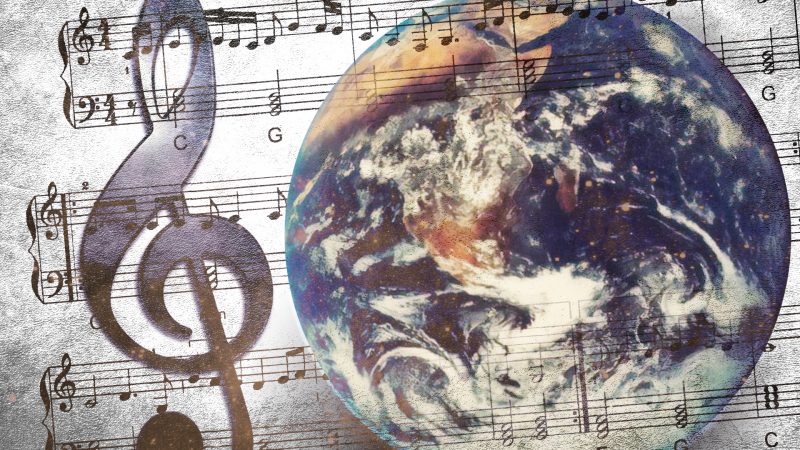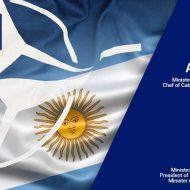As Bob Dylan once sang, the times they are a-changin’, only now, this sentiment likely seems quite obvious to everyone. Our sources for knowledge, information and views are increasingly being defined online on platforms like YouTube, giving the traditional centers of knowledge a run for their money.
As a Turkish musician born in the 1970s, most of my life I was taught that “Western Classical Music” is absolutely superior to all other music. With all the concepts surrounding European orchestral music, such as mathematics, acoustics, institutions, hierarchy, discipline, the musical ‘genius’ etc, I had no doubt that this music was superior to anything else on earth. I’ve always been at peace with the idea that there is a holistic music world where only demigods can enter, while for ordinary humans like me, there are other lesser realms to reside in. You get used to the idea that during the 18th century, some composers came from what was essentially outer space to bring us the best, the most righteous music possible. Later on (no one is sure why) these ‘alien’ composers took their leave, after which no geniuses or prophets returned again. We all know these holy names; Bach, Mozart, Beethoven, etc. Even now I feel like questioning their superiority is a result of my being disrespectful or envious. I almost feel like I will be struck by lightning for daring to question their dominance.
As is the case in all abstract fields, in music, we desperately need wise people to tell us what is good and right. In my youth, like anyone else, I was in search of wise and knowledgeable people to show me the way. Naturally, one takes to the idols presented by the experts… listening alone is not enough, someone has to explain to you what’s going on. If you are one of the lucky ones to attend an academy things get a bit easier. Today, these “institutional opinion leaders” are being replaced by Youtubers… for better or worse. The new generation of thinkers are undoubtedly having a deep impact on the industry. As a result of the spread of information outside the academy, I now see much more people questioning what was once presented as “superior music”, and, to my surprise, they seemingly have some very good reasons to do so.
Adam Neely is one figure questioning the supremacy of 18th century European classical music in his videos, such as one entitled “Music Theory and White Supremacy.” As a bass player and a Berklee graduate, I have a similar background to Neely… maybe that’s why the points he made in this video resonate with me (not that I agree with all of them). I won’t go into details about his perspective but I believe it’s pretty important to hear him out, especially because there are a number of important connections to contemporary political and intellectual dilemmas.
Many music theorists today are trying to start a new trend, and are even redefining what music itself is, something I think there is a great necessity for in the 21st century. The main argument is that the art of harmony, the centuries of old gathered knowledge of polyphony, has reached its limit, and it is time to move on to new styles. Arithmetical possibilities of all sorts have been exhausted, while all possible rhythmical combinations being used and abused. We need to move to some uncharted territories in order to progress. Styles like microtonality might be the new playground, utilizing the notes that fall between the equal-tempered tunings standard to Western music. Jacob Collier comes to mind as one example. Maybe with Quincy Jones, Herbie Hancock and Stevie Wonder behind the curtains, a musical revolution is at hand… who can say?
Nonetheless, I believe there is a serious obstacle in the way of any revolutionary change. Western music theory is just an isolated idea, it is rooted in Western ways of looking at the world, one particularly notable example being the classic philosophical concept of “atomism”.
Atomism (from Greek ἄτομον, atomon, i.e. “uncuttable, indivisible”) is a type of natural philosophy proposing that the physical world is composed of fundamental indivisible components known as atoms. Western music theory has a lot in common with this philosophical theory… just like an architect working brick by brick, music is seen as having its own building blocks. The musical temperament system’s logic itself could be traced to this essential thought, as I will try to explain.
For example, I have been particularly interested in how popular Barry Harris’ piano lessons are on Youtube. While talking about the early jazz improvisations, he mentions “movements”, not building blocks. Yet, institutionalized jazz education made musicians memorize building blocks. One example of this is the concept of “licks”, something that, to me, feels like a very “atomist” approach to the subject. We are not only composing but also analyzing works in the same manner: “divide and conquer”. If you want to understand a structure, divide it into graspable smallest parts and master them. This is a way of thinking based on the assumption that the whole universe is made of basic, definitive building blocks, “atoms”. If you understand and master them, you can build an entire universe – a formula for productivity, a recipe for becoming a God. However, this only works if you grant the assumption of the building blocks in the first place.
For centuries, this formula undoubtedly worked just fine, just as the Newton physics worked just fine for everyday tasks. Perfect polyphony, for instance, is still a mystery because the very basic temperament system’s arithmetical problems are impossible to solve. Thus, we all have to live with “equal temperament”… it’s not perfect, but it is good enough to make the magic happen. Most likely, the formulation of microtonal polyphony will also entail a period of things remaining just “good enough”, a complete theory isn’t necessary.
Most cultures where music is based on microtonal tunings don’t have the concept of the “atom” as a part of the fundamental structure of their thinking. Scales are not combinations of mathematically known notes, but are rather based on movements. If you were born, raised and educated in an “atomist” culture, however, it’s really hard to put away “atom”… it is hard to even imagine what could go in its place. However, even in physics, “atom” is no longer “fundamental indivisible component”… our understanding of the deep structures of reality are changing, and so the elements of culture built on these old ideas need to change as well.
What the 21st century needs is to take the next step, to find the equivalent of quantum physics for music theory. There’s no doubt that this will require a deep paradigm shift. We will need new definitions of what is “perfect”, even what is “good”.
In Turkey in the 1980s, there was a famous debate on what higher music should be. The dominant argument was “higher music should be polyphonic”. Predominantly under the influence of eastern monophonic, microtonal musical traditions, the intellectual elite was nonetheless convinced that the European way of musical composition was the way to go. So many experiments were done attempting to combine these two traditions… it is, after all, somewhat natural to try to bridge Western and Eastern music given that Turkey sits between the two geographically. Although academics are still working on “polyphonization of microtonal music”, the debate is not that vibrant or new anymore. Did we learn to use polyphony, or did music end up taking a different course in the rest of the world?
“What music is superior?”… this question reflects broader political power struggles happening in the world. The claim to “superior music” belongs to the unipolar world dominated by the West, a world we no longer live in. It was certainly a useful idea for the West during that period, but now that a multipolar world is being established, it seems all too obvious that there is no one superior music style. There are many musical realms, histories, concepts, ideas… none of them is superior or inferior to another.
Although I can see how 18th century European classical is based to some degree on Western white supremacy, it still sounds a bit far fetched. Perhaps this American based idea’s purpose is to help get Black American music the same respect and level of dominance that European classical music had, an act of revenge against a dark past. From the perspective of a musician not living in the US, the debate feels localized to that region. Although I have been heavily influenced by African-American musical traditions, I am also connected to debates far beyond this context. Still, it must be said that while African-American music has dominated the world music ecosystem in the late 20th century and generated massive economic power, it still has a long way to go to compete with Europe’s success… although, perhaps the definition of success itself has changed with the times.
On an admittedly personal and subjective level, I feel that if the world continues to develop towards multipolarity, Turkey might be able to find a way out of being crushed between the struggle of East versus West and finally find itself in a climate where it can develop its own new and truly beautiful music.









Leave a Reply